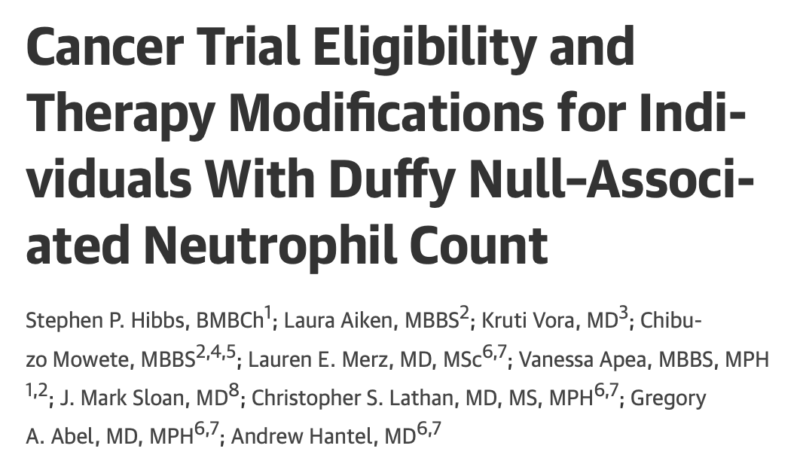Dana-Farber Cancer Institute shared on Linkedin:
” Many clinical trials of new cancer drugs may be inappropriately excluding some people with ‘Duffy-null phenotype,’ a trait found predominantly in people of African or Middle Eastern descent, researchers at Dana-Farber and Queen Mary University of London report in a new study.
People with Duffy-null phenotype have relatively low counts of neutrophils – a type of white blood cell – as measured in standard blood tests. This is not because they have fewer neutrophils overall, but because their neutrophils are more frequently located in other body tissues. Tests that restrict clinical trial eligibility to patients with certain blood levels of neutrophils may therefore be unfairly discriminating against patients who could potentially benefit from trial therapies.
The failure to account for Duffy-null phenotype also means that recommendations for many standard cancer drugs inappropriately call for less- effective doses for some individuals, researchers say. Neutrophils are white blood cells that kill bacteria and other foreign microbes. Tests that count them in a blood sample are performed to ensure that patients can safely be treated with chemotherapy or other anti-cancer drugs.
Neutrophil levels are often reduced by cancer drugs, potentially raising the risk of infection. For patients to qualify for a clinical trial or a standard dose of many cancer drugs, their neutrophil levels need to be above a certain threshold to ensure they will retain enough of these cells following treatment.
The threshold was established by studies conducted primarily in patients of European descent who rarely have the Duffy-null phenotype. Many healthy people with the Duffy-null phenotype, however, normally have lower levels of neutrophils in their blood and relatively higher levels in other tissues.
‘People with the Duffy-null phenotype are equally able to fight off infections compared to others,’ says Andrew Hantel, the senior author of the new paper, published in JAMA Network Open. ‘The concern is that they’ve been excluded from clinical trials because the neutrophil blood levels that are normal for them can fall below the cut-off points for trial participation. In this study, we explored the extent to which this occurs.’
‘Natural variation in neutrophil counts between people of different ancestries has been historically described by the inaccurate and now-outdated diagnosis ‘benign ethnic neutropenia,’ says study first author Stephen Hibbs, BMBCh, of Queen Mary University of London. ‘But since this variation was discovered to be caused by the Duffy-null phenotype, we need to re-examine the ways in which neutrophil count misinterpretation can affect patient care.’
In the study, researchers examined participation criteria for 289 phase III trials of drugs for the five most prevalent cancers in the United States and United Kingdom.”
Authors: Stephen P. Hibbs, Laura Aiken, Kruti Vora, Chibuzo Mowete, Lauren E. Merz, Vanessa Apea, J. Mark Sloan, Christopher S. Lathan, Gregory A. Abel, Andrew Hantel.



